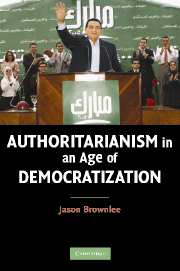Book contents
- Frontmatter
- Contents
- List of Figures and Tables
- Abbreviations and Acronyms
- Acknowledgments
- Introduction: Authoritarianism in an Age of Democratization
- 1 The Political Origins of Durable Authoritarianism
- 2 The Inception of Ruling Parties
- 3 Institutional Legacies and Coalitional Tensions
- 4 Ruling Parties and Regime Persistence
- 5 Elite Defections and Electoral Defeat
- 6 Confrontation and Democratization
- 7 Conclusions
- References
- Index
4 - Ruling Parties and Regime Persistence
Egypt and Malaysia during the Third Wave
Published online by Cambridge University Press: 05 June 2012
- Frontmatter
- Contents
- List of Figures and Tables
- Abbreviations and Acronyms
- Acknowledgments
- Introduction: Authoritarianism in an Age of Democratization
- 1 The Political Origins of Durable Authoritarianism
- 2 The Inception of Ruling Parties
- 3 Institutional Legacies and Coalitional Tensions
- 4 Ruling Parties and Regime Persistence
- 5 Elite Defections and Electoral Defeat
- 6 Confrontation and Democratization
- 7 Conclusions
- References
- Index
Summary
During the 1980s and 1990s, as dictatorships in Latin America, Eastern Europe, Africa, and Asia collapsed, Egypt and Malaysia's autocracies stood firm. Although opposition movements across the developing world vaulted into power through dramatic election victories, President Mubarak and Prime Minister Mahathir thwarted kindred campaigns against their rule. Both rulers seemed to exercise almost unparalleled domination and to have an extraordinary ability to preserve their own incumbency while preparing the way for their chosen successors. And although each man held power longer than any of his predecessors, their extended tenures were less the product of individual guile or charisma than the continuation of a historical legacy each inherited: a functioning ruling party organization that neither would have elected to develop but from which each benefited enormously.
This chapter concludes the causal narratives of Egyptian and Malaysian political development that began with early elite conflict and continued through the party maintenance and leadership successions covered in Chapter 3. In contrast to many studies of domestic regime change and democratization during the third wave era, the following accounts show a pattern of autocratic endurance and opposition defeat. Despite the opportunity of multiple elections in which they could compete, antiregime activists repeatedly failed to marshal elite support or to translate their popular constituencies into political power. The linchpin of Mubarak and Mahathir's shared success at preserving themselves and rebuffing their critics was a ruling party through which disparate elites cohered within the regime and controlled the electoral arena available to the opposition.
- Type
- Chapter
- Information
- Authoritarianism in an Age of Democratization , pp. 122 - 156Publisher: Cambridge University PressPrint publication year: 2007



